Unit 6 Topic 3I will remember our friendship forever Section A课件(共29张PPT) 仁爱版九年级英语下册
文档属性
| 名称 | Unit 6 Topic 3I will remember our friendship forever Section A课件(共29张PPT) 仁爱版九年级英语下册 |  | |
| 格式 | pptx | ||
| 文件大小 | 767.6KB | ||
| 资源类型 | 教案 | ||
| 版本资源 | 仁爱科普版 | ||
| 科目 | 英语 | ||
| 更新时间 | 2024-01-02 12:26:41 | ||
图片预览

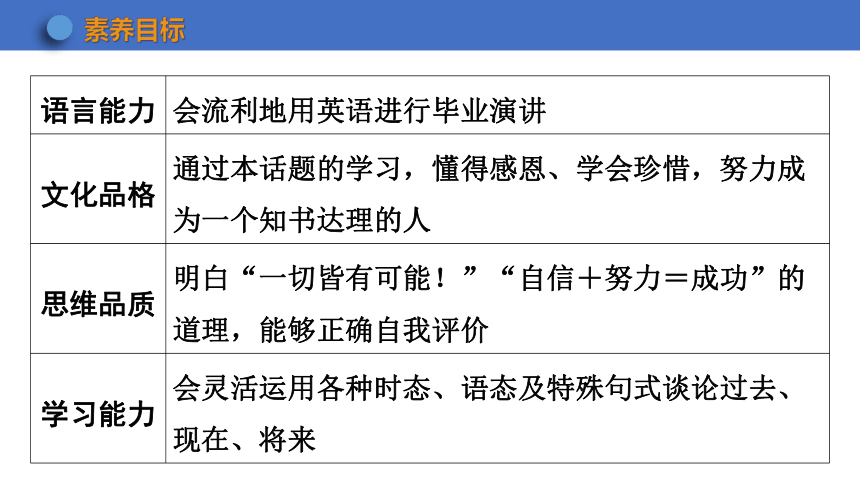
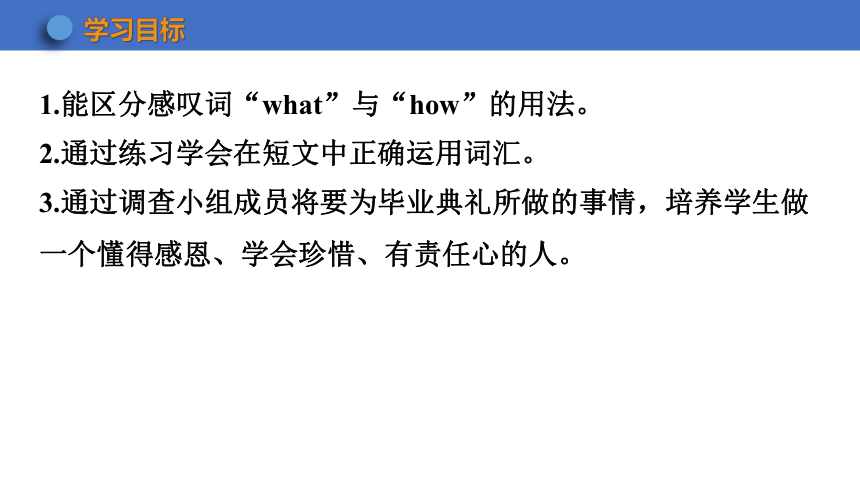
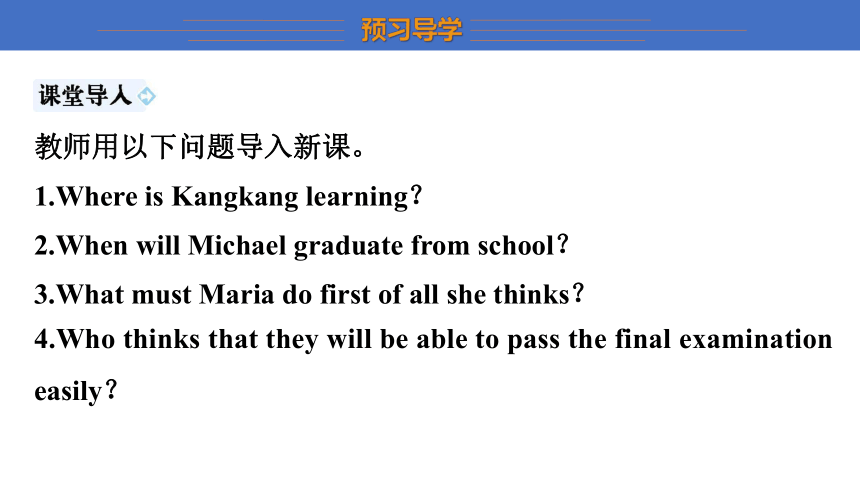

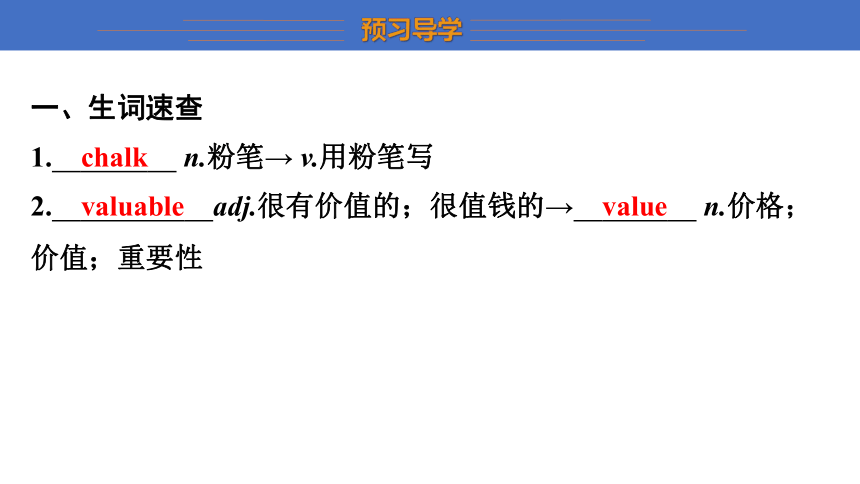
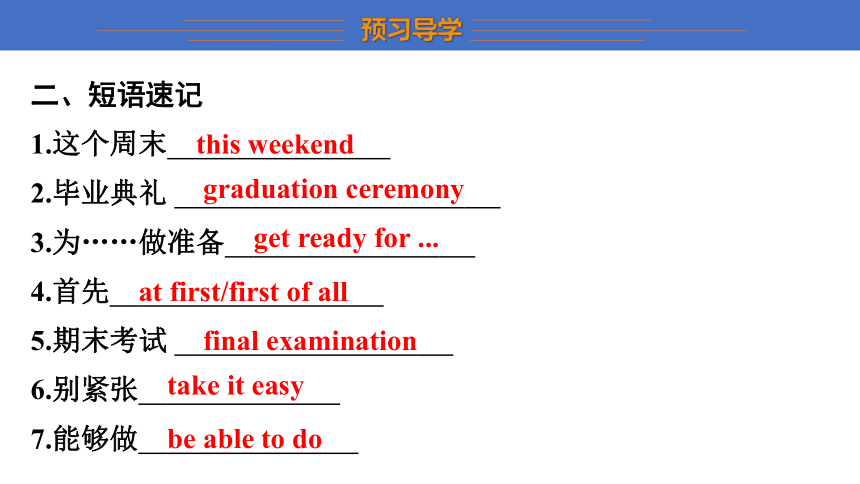
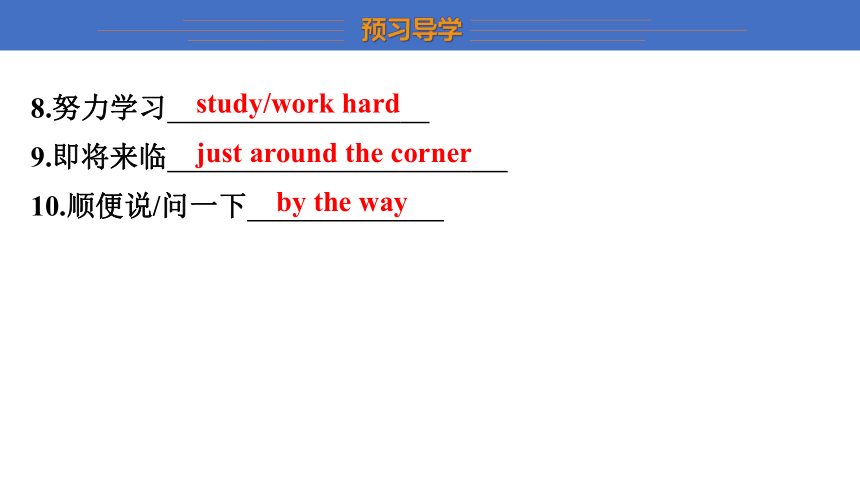
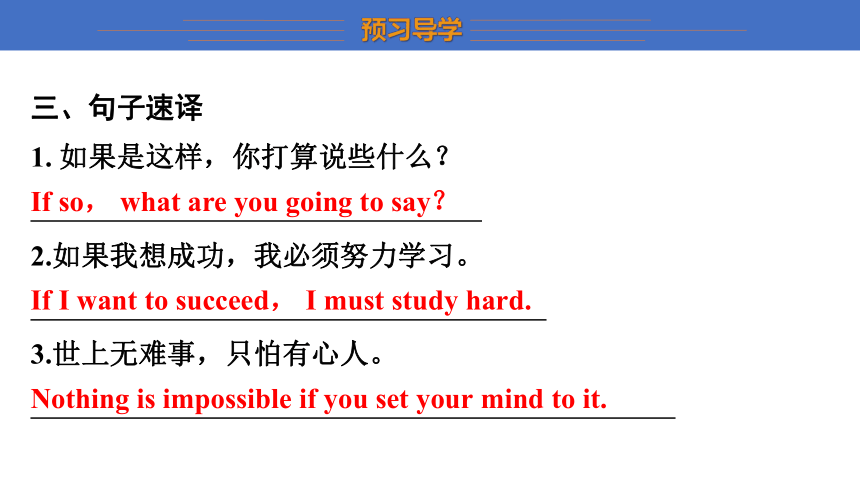
文档简介
(共29张PPT)
九年级·英语·仁爱版·全一册
Topic 3
Section A
语言能力 会流利地用英语进行毕业演讲
文化品格 通过本话题的学习,懂得感恩、学会珍惜,努力成为一个知书达理的人
思维品质 明白“一切皆有可能!”“自信+努力=成功”的道理,能够正确自我评价
学习能力 会灵活运用各种时态、语态及特殊句式谈论过去、现在、将来
1.能区分感叹词“what”与“how”的用法。
2.通过练习学会在短文中正确运用词汇。
3.通过调查小组成员将要为毕业典礼所做的事情,培养学生做一个懂得感恩、学会珍惜、有责任心的人。
教师用以下问题导入新课。
1.Where is Kangkang learning?
2.When will Michael graduate from school?
3.What must Maria do first of all she thinks?
4.Who thinks that they will be able to pass the final examination easily?
·导学建议·
课前教师可以用英语与同学们聊聊三年来的经历,从而调动学生的积极性。
一、生词速查
1. chalk n.粉笔→ v.用粉笔写
2. valuable adj.很有价值的;很值钱的→ value n.价格;价值;重要性
chalk
valuable
value
二、短语速记
1.这个周末 this weekend
2.毕业典礼 graduation ceremony
3.为……做准备 get ready for ...
4.首先 at first/first of all
5.期末考试 final examination
6.别紧张 take it easy
7.能够做 be able to do
this weekend
graduation ceremony
get ready for ...
at first/first of all
final examination
take it easy
be able to do
8.努力学习 study/work hard
9.即将来临 just around the corner
10.顺便说/问一下 by the way
study/work hard
just around the corner
by the way
三、句子速译
1. 如果是这样,你打算说些什么?
If so, what are you going to say?
2.如果我想成功,我必须努力学习。
If I want to succeed, I must study hard.
3.世上无难事,只怕有心人。
Nothing is impossible if you set your mind to it.
If so, what are you going to say?
If I want to succeed, I must study hard.
Nothing is impossible if you set your mind to it.
四、想一想
预习课本1a,回答下列问题。
1.What should they do for the graduation ceremony in Jane’s opinion?
Jane thinks they should prepare some gifts for the graduation ceremony.
Jane thinks they should prepare some gifts for the graduation ceremony.
2.Who will say he/she has learned not only how to study, but how to be a man at the ceremony?
Kangkang will say he has learned not only how to study, but how to be a man at the ceremony.
3.Who will also remember their friendship forever?
Michael will also remember their friendship forever.
Kangkang will say he has learned not only how to study, but how to be a man at the ceremony.
Michael will also remember their friendship forever.
·导学建议·
课前让学生预习课本1a,放两遍录音后完成课本1b,课前检查答案并让学生复述1a。
区分感叹词“what”与“how”的用法
根据句意及句式在横线上填入what或how
1. How Tom loves his wife!
How
2. What lovely girls they are!
What
◎学法指导:感叹的中心落在名词上,用what引导感叹句:(1)What+a/an+形容词+名词+主语+谓语!
(2)What+形容词+不可数名词+主语+谓语!
(3)What+形容词+可数名词复数+主语+谓语! 感叹的中心落在形容词或副词或整个句子,用how引导感叹句:How+形容词或副词+主语+谓语!
·导学建议·
加强学生对感叹词的具体用法的理解,通过练习区分what和how的基本用法,从而巩固感叹句的基本用法。
在短文中正确运用词汇训练
阅读课本4,结对识词并完成练习。
The children in Class Three have done an 1. excellent job for the 2. graduation ceremony.The 3. decoration of the classroom was very 4. beautiful .Everyone prepared 5. dozens of presents and exchanged them with each other.
excellent
graduation
decoration
beautiful
dozens
Some students wrote down their best 6. wishes on the cards, such as “Nothing is 7. impossible if you set your mind to it”, and “Where there is a will, there is a way”.The presents are cheap, but they are valuable for them to remember the friendship.
wishes
impossible
·导学建议·
将学生分成小组,看哪个小组完成得又快又准。
◎学法指导:在做题之前可以先浏览一遍所给词汇,说一说所给词汇的派生词都有哪些。
小组调查
在小组里调查小组成员将要为毕业典礼做的事情,每组派代表进行全班展示。
Name What you do for the graduation ceremony
◎学法指导:在小组里调查小组成员将要为毕业典礼做的事情,注意祈使句的使用。
·导学建议·
此活动是课本3的拓展,让学生课后以“What will you do for the graduation ceremony?”为题写一篇100字左右的英语短文,练习描述打算要做的事情。
if的用法
●If there are fewer trees, there will be more pollution.如果树越来越少,污染就会越来越多。
◎观察思考:
1.If Marcia lives alone, she will keep a pet parrot.如果玛西娅一个人住,她会养一只鹦鹉当宠物。
are
will be
2.I’ll go to the beach if it doesn’t rain this weekend.如果这个周末不下雨,我就去海滩。
3.Don’t follow me if you don’t trust me.若你不相信我就不要跟着我。
4.If he goes abroad, he can earn much more money.若他出国,他能赚更多钱。
◎用法总结: 条件状语从句表示主句的动作发生的条件。if意为“如果;假如”,表示在某种条件下某事很可能会发生。if引导的条件状语从句可以位于主句之前,也可以位于主句之后。如果从句在前,从句和主句之间用逗号隔开。从句用一般现在时,主句可用一般将来时、祈使句、一般现在时(主从句都是客观真理)及含有情态动词的句子。
易错辨析
1.If you put wood into water, it floats (float).
2.If she comes (come) to Beijing, please call (call) me.
3.I will give (give) him a hand if he gives (give) me some money.
floats
comes
call
will give
gives
用括号内所给单词的适当形式填空
一般将来时的表达方式
●Look at the dark clouds, there is going to be a storm.看那些乌云,暴风雨就要来了。
◎观察思考:这里be going to的语法作用: 构成一般将来时。表示“有迹象要发生的事”。
构成一般将来时。
表示“有迹象要发生的事”。
一般将来时态的构成 am/is/are going to do 主语的意图,即将做某事;计划、安排要发生的事;有迹象要发生的事
will do 在陈述句中用于各人称,在征求意见时常用于第二人称
shall do 用于第一人称,常被will 所代替,二者都可以缩写成’ll
◎用法总结:
(续表)
一般将来时态的构成 am/is/are doing 当动词是go、come、start、move、sail、leave、arrive、stay等时,表示按计划即将发生的动作
am/is/are to do 表示按计划要发生的事或征求对方意见
am/is/are about to do 表示即将发生的动作,意为“很快,马上”。后面一般不跟时间状语
翻译下列句子
1.She is going to celebrate her 30th birthday next year.
她明年就过30岁生日了。
2.The dictionary is not to be purchased here.
这本词典在这里买不到。
3.We shall take different routes.
我们将走不同的路线。
她明年就过30岁生日了。
这本词典在这里买不到。
我们将走不同的路线。
4.明天早上他将乘7时30分的火车到达。
He’s arriving tomorrow morning on the 7:30 train.
5.再见到你将会是很愉快的事情。
It will be great to see you again.
He’s arriving tomorrow morning on the 7:30 train.
It will be great to see you again.
九年级·英语·仁爱版·全一册
Topic 3
Section A
语言能力 会流利地用英语进行毕业演讲
文化品格 通过本话题的学习,懂得感恩、学会珍惜,努力成为一个知书达理的人
思维品质 明白“一切皆有可能!”“自信+努力=成功”的道理,能够正确自我评价
学习能力 会灵活运用各种时态、语态及特殊句式谈论过去、现在、将来
1.能区分感叹词“what”与“how”的用法。
2.通过练习学会在短文中正确运用词汇。
3.通过调查小组成员将要为毕业典礼所做的事情,培养学生做一个懂得感恩、学会珍惜、有责任心的人。
教师用以下问题导入新课。
1.Where is Kangkang learning?
2.When will Michael graduate from school?
3.What must Maria do first of all she thinks?
4.Who thinks that they will be able to pass the final examination easily?
·导学建议·
课前教师可以用英语与同学们聊聊三年来的经历,从而调动学生的积极性。
一、生词速查
1. chalk n.粉笔→ v.用粉笔写
2. valuable adj.很有价值的;很值钱的→ value n.价格;价值;重要性
chalk
valuable
value
二、短语速记
1.这个周末 this weekend
2.毕业典礼 graduation ceremony
3.为……做准备 get ready for ...
4.首先 at first/first of all
5.期末考试 final examination
6.别紧张 take it easy
7.能够做 be able to do
this weekend
graduation ceremony
get ready for ...
at first/first of all
final examination
take it easy
be able to do
8.努力学习 study/work hard
9.即将来临 just around the corner
10.顺便说/问一下 by the way
study/work hard
just around the corner
by the way
三、句子速译
1. 如果是这样,你打算说些什么?
If so, what are you going to say?
2.如果我想成功,我必须努力学习。
If I want to succeed, I must study hard.
3.世上无难事,只怕有心人。
Nothing is impossible if you set your mind to it.
If so, what are you going to say?
If I want to succeed, I must study hard.
Nothing is impossible if you set your mind to it.
四、想一想
预习课本1a,回答下列问题。
1.What should they do for the graduation ceremony in Jane’s opinion?
Jane thinks they should prepare some gifts for the graduation ceremony.
Jane thinks they should prepare some gifts for the graduation ceremony.
2.Who will say he/she has learned not only how to study, but how to be a man at the ceremony?
Kangkang will say he has learned not only how to study, but how to be a man at the ceremony.
3.Who will also remember their friendship forever?
Michael will also remember their friendship forever.
Kangkang will say he has learned not only how to study, but how to be a man at the ceremony.
Michael will also remember their friendship forever.
·导学建议·
课前让学生预习课本1a,放两遍录音后完成课本1b,课前检查答案并让学生复述1a。
区分感叹词“what”与“how”的用法
根据句意及句式在横线上填入what或how
1. How Tom loves his wife!
How
2. What lovely girls they are!
What
◎学法指导:感叹的中心落在名词上,用what引导感叹句:(1)What+a/an+形容词+名词+主语+谓语!
(2)What+形容词+不可数名词+主语+谓语!
(3)What+形容词+可数名词复数+主语+谓语! 感叹的中心落在形容词或副词或整个句子,用how引导感叹句:How+形容词或副词+主语+谓语!
·导学建议·
加强学生对感叹词的具体用法的理解,通过练习区分what和how的基本用法,从而巩固感叹句的基本用法。
在短文中正确运用词汇训练
阅读课本4,结对识词并完成练习。
The children in Class Three have done an 1. excellent job for the 2. graduation ceremony.The 3. decoration of the classroom was very 4. beautiful .Everyone prepared 5. dozens of presents and exchanged them with each other.
excellent
graduation
decoration
beautiful
dozens
Some students wrote down their best 6. wishes on the cards, such as “Nothing is 7. impossible if you set your mind to it”, and “Where there is a will, there is a way”.The presents are cheap, but they are valuable for them to remember the friendship.
wishes
impossible
·导学建议·
将学生分成小组,看哪个小组完成得又快又准。
◎学法指导:在做题之前可以先浏览一遍所给词汇,说一说所给词汇的派生词都有哪些。
小组调查
在小组里调查小组成员将要为毕业典礼做的事情,每组派代表进行全班展示。
Name What you do for the graduation ceremony
◎学法指导:在小组里调查小组成员将要为毕业典礼做的事情,注意祈使句的使用。
·导学建议·
此活动是课本3的拓展,让学生课后以“What will you do for the graduation ceremony?”为题写一篇100字左右的英语短文,练习描述打算要做的事情。
if的用法
●If there are fewer trees, there will be more pollution.如果树越来越少,污染就会越来越多。
◎观察思考:
1.If Marcia lives alone, she will keep a pet parrot.如果玛西娅一个人住,她会养一只鹦鹉当宠物。
are
will be
2.I’ll go to the beach if it doesn’t rain this weekend.如果这个周末不下雨,我就去海滩。
3.Don’t follow me if you don’t trust me.若你不相信我就不要跟着我。
4.If he goes abroad, he can earn much more money.若他出国,他能赚更多钱。
◎用法总结: 条件状语从句表示主句的动作发生的条件。if意为“如果;假如”,表示在某种条件下某事很可能会发生。if引导的条件状语从句可以位于主句之前,也可以位于主句之后。如果从句在前,从句和主句之间用逗号隔开。从句用一般现在时,主句可用一般将来时、祈使句、一般现在时(主从句都是客观真理)及含有情态动词的句子。
易错辨析
1.If you put wood into water, it floats (float).
2.If she comes (come) to Beijing, please call (call) me.
3.I will give (give) him a hand if he gives (give) me some money.
floats
comes
call
will give
gives
用括号内所给单词的适当形式填空
一般将来时的表达方式
●Look at the dark clouds, there is going to be a storm.看那些乌云,暴风雨就要来了。
◎观察思考:这里be going to的语法作用: 构成一般将来时。表示“有迹象要发生的事”。
构成一般将来时。
表示“有迹象要发生的事”。
一般将来时态的构成 am/is/are going to do 主语的意图,即将做某事;计划、安排要发生的事;有迹象要发生的事
will do 在陈述句中用于各人称,在征求意见时常用于第二人称
shall do 用于第一人称,常被will 所代替,二者都可以缩写成’ll
◎用法总结:
(续表)
一般将来时态的构成 am/is/are doing 当动词是go、come、start、move、sail、leave、arrive、stay等时,表示按计划即将发生的动作
am/is/are to do 表示按计划要发生的事或征求对方意见
am/is/are about to do 表示即将发生的动作,意为“很快,马上”。后面一般不跟时间状语
翻译下列句子
1.She is going to celebrate her 30th birthday next year.
她明年就过30岁生日了。
2.The dictionary is not to be purchased here.
这本词典在这里买不到。
3.We shall take different routes.
我们将走不同的路线。
她明年就过30岁生日了。
这本词典在这里买不到。
我们将走不同的路线。
4.明天早上他将乘7时30分的火车到达。
He’s arriving tomorrow morning on the 7:30 train.
5.再见到你将会是很愉快的事情。
It will be great to see you again.
He’s arriving tomorrow morning on the 7:30 train.
It will be great to see you again.
同课章节目录
- Unit 5 China and the world
- Topic 1 China attracts millions of tourists from a
- Topic 2 He is really the pride of China.
- Topic 3 Now it is a symbol of England.
- Unit 6 Entertainment and Friendship.
- Topic 1 I would rather watch sports shows than tho
- Topic 2 Who is your favorite character in literatu
- Topic 3 I will remember our friendship forever.
